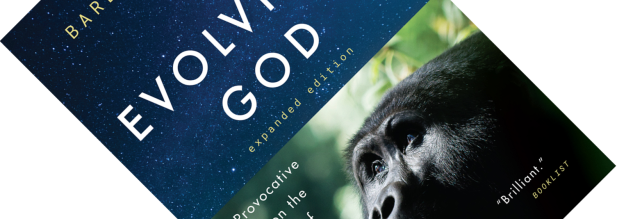Once you have worked in the book industry for a while, you will notice that publishers like to throw around words like “provocative” and “paradigm-shifting” when promoting new books. And so it is with Evolving God, the subtitle of which promises a provocative view on the origins of religion. If you’re expecting religion-bashing as done by the likes of Richard Dawkins, look elsewhere. Though she speaks of the human religious imagination, she early on makes it clear that she herself does not wish to imply that humans make up their deities, nor does she claim that sacred beings are real in our world. This is outside of the realm of scientific inquiry and she remains agnostic on these matters. So much for being controversial.

“Evolving God: A Provocative View on the Origins of Religion”, written by Barbara J. King, published by The University of Chicago Press in an expanded edition in May 2017 (paperback, 289 pages), originally published in 2007
This book hinges on the interesting observation of the pervasiveness, both in space and time, of religion. The deities and rituals vary, but the underlying human desire remains. What follows is a very reasoned anthropological treatise that centres around the concept of belongingness: mattering to someone who matters to you. We humans crave emotional connection, and this is something we share with our closest living relatives, the great apes. In King’s view, the common ancestor of us and today’s gorillas and chimpanzees showed social behaviour that formed the precursor for the evolution of religion. These precursors (empathy, meaning-making, rule-following, and imagination) are still expressed by today’s primates, as King has observed in her own fieldwork. And in our human ancestors it evolved into a desire for belongingness that went beyond the family and immediate social groups. And thus was born the human religious imagination. A large part of the book is dedicated to a tour of the palaeoanthropological and archaeological evidence spanning the last few millions years, showing ever more signs of rituals and symbol use, especially surrounding funerary practices.
I read this part of the book with some interest, and I think King does a good job of righting many misperceptions of our human ancestors, and of evolution in general. But it was the final two chapters that I found far more interesting, and you could do worse than starting reading these chapters first.
“This book hinges on the interesting observation of the pervasiveness, both in space and time, of religion. The deities and rituals vary, but the underlying human desire remains.”
In chapter 7, “Is God in the Genes?”, King elaborates on why she thinks her focus on belongingness sets apart her viewpoints from the dominant narratives of today that focus on genes or brain domains. I agree with her that the idea of there being a gene for religion (or for similarly complex traits) is too simplistic a notion. But she also disagrees with the viewpoint that some authors have put forward that religion has emerged as a mere side-effect of the way our brains work. Here I remain unconvinced, however. Maybe I am missing the point, but nothing I have read in this book – and of the ideas she has put forward of religion coming about as an extension of our ancestors relating to each other in deeply emotional ways – seems to me to be incompatible with the notion that religion has emerged as a mere side effect.
Chapter 8, “God and Science in Twenty-first Century America”, is equally very interesting, and perhaps explains why the author thought it necessary to subtitle her book as giving a provocative view. Here, she discusses the religion-science wars that are so pervasive in the US, and the whole evolution-intelligent design debate. I have recently written briefly on the latter, but it was interesting to read her take on it, from the perspective of a professor lecturing at an American university. The chapter is also interesting as it reveals her personal stance on science and religion. She is clearly not a fan of Dawkins and the idea that science and religion are wholly incompatible. Interestingly, Gould’s idea of science and religion being non-overlapping magisteria that can peacefully coexist, without either teaching the other something, doesn’t resonate with her either. She feels most attracted to the ideas put forth by theologian John Haught, who promotes a consilience between science and religion, that is, that they are just different paths to the same ultimate truth, both valid.
Even more interesting, then, is the afterword that was written ten years later for this expanded edition. She highlights some research that bolsters her case for the importance of belongingness, and corrects some factual information in her original chapters in light of where the field of palaeoanthropology is at now (for example, we now have plenty of evidence of interbreeding between our human ancestors and Neanderthals). But she also details how her thinking on the relation between science and religion has changed since publication of this book, and how she feels less drawn to Haught’s ideas.
All in all, then, I found this book to be a carefully reasoned and fairly interesting read. I personally did not think her ideas of precursors to religion being traceable to our primate ancestors were particularly provocative, but maybe other readers will. The book has also failed to convince me that religion being rooted in belongingness somehow would make it more than just a by-product of our evolution. Maybe I have missed her point.
Disclosure: The publisher provided a review copy of this book. The opinion expressed here is my own, however.


2 comments